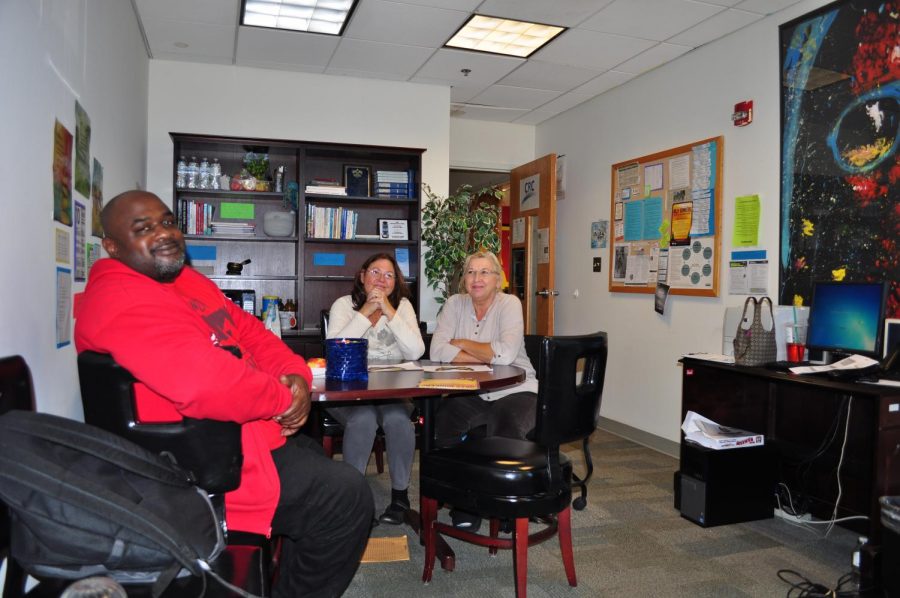AACC’s recovery center aids addicted students
Ron Easley (left) and Gwinn Spence work under Loretta Lawson-Munsey at the lounge-like recovery center to help other students escape drug addictions.
November 1, 2017
Ron Easley compared his more than 20 years addicted to drugs to putting a gun to his head every day, never knowing if it would go off.
“I was out there, homeless, on the streets of Baltimore City,” said Easley, a 48-year-old AACC student who said he started taking opioids—an addictive drug that relieves pain and causes euphoric effects—in the early ’90s. “[The drug world] ruined my life, literally. … I mean, [I had] no life at all.”
Easley said he sought help a few times over the years, but “a lot of doors got closed in [his] face” because he was homeless and did not have insurance.
“There were options, but they weren’t for me,” Easley said. “The only option that … I was able to take advantage of was being arrested.”
Easley said he was able to turn his life around after he was arrested and sent to a recovery house two years ago. While there, a friend introduced him to the substance abuse support programs and internship opportunities at AACC.
Easley now does work-study and has an internship at AACC while working toward an associate’s degree in addiction counseling.
“[Interning at AACC] has been a godsend for me,” he said.
Easley is in the process of becoming certified as a peer support specialist from the Association of Recovery in Higher Education.
The ARHE certifies volunteers with addictions to help others in recovery. The certification requires volunteers to have at least two years of stable sobriety, 46 continuing education hours and 500 hours of supervised volunteer work.
In 2011, AACC became the first community college in Maryland to open a Collegiate Recovery Center, a place where students can come to ask questions about substance abuse and get help from trained peer support specialists.
Twenty-eight year-old Kristin Edwards is a peer support specialist who works for Evolve Life Center—a Pasadena, Maryland, program of transitional housing and rehabilitation—and speaks monthly at AACC’s recovery center.
“I think that they should have something like this at every school,” said Edwards, who has been sober for three and a half years.
“The first time I smoked weed was with my brother—he was 13, I was 11. My dad was OK with it. … It just progressed really fast. … before I knew it I was addicted to heroin and I was 17.”
Loretta Lawson-Munsey, coordinator of AACC’s substance abuse education office, co-founded the college’s recovery center with AACC alumna Angel Traynor.
Lawson-Munsey said she opened the recovery center because it is more helpful for students struggling with addiction to hear from others who have been through something similar than from those who have not.
“I’m not in recovery, so I haven’t walked their walk,” said Lawson-Munsey. “And I just felt that they needed support from someone who knew what they were talking about, not just someone that was empathetic about it.”
In addition to peer support sessions, students visiting the center can attend weekly 12-step meetings, request counseling or other professional services, or spend time with peers relaxing or doing homework.
An average of four to seven people attend the weekly meeting, according to Lawson-Munsey.
“You’re never cured,” said Gwinn Spence, a peer support specialist at AACC who first entered recovery in 1985. “[But] there is life on the other side. … You need the support of a community of people.”
Spence said the most important thing for friends and family to do is to become educated about addiction.
“Rock bottom for a heroin addict is death,” Spence said. “[But] it doesn’t have to get that bad.”
The recovery center holds meetings every Tuesday in SUN 208B for people with loved ones struggling with addiction.
Both staffing and funding are a constant struggle for the recovery center, according to Lawson-Munsey.
AACC hosts the recovery center and pays Lawson-Munsey to work there part-time. For everything else, the center is dependent on the fundraising efforts of the Prevention, Education, Engagement, Recovery and Support—PEERS—student club and the budget the Student Government Association grants to that club.
The center is staffed mainly by volunteers, work-study students and interns, many of whom are working toward a degree in substance abuse counseling or a similar major.
Easley said at first he was afraid to reach out for help and is especially concerned with reaching out to others who may be in the same situation.
“I know there’s somebody that’s struggling [at AACC]—I know there’s somebody going through something, but they’re probably just afraid to come out,” Easley said. “I can understand the fear, but … don’t be afraid. … There’s more of us out there.”












